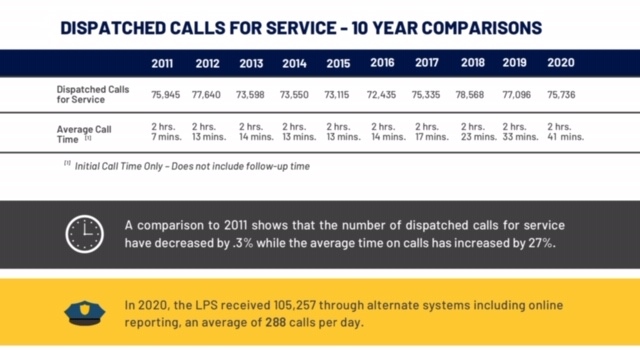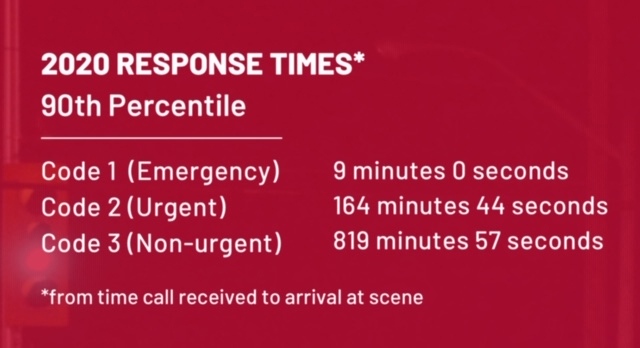How long you can expect to wait for police in London on the rise
Police response times are suffering in London as officers face increasingly complex calls for help.
On Thursday, the London Police Services Board received the 2020 Annual Report on policing, including average response times to 911 calls.
The highest priority calls (Code 1), life-threatening emergencies, now take an average of nine minutes between calling 911 and the arrival of a police officer.
Urgent calls of a non-life-threatening crime in progress now takes two hours and 44 minutes on average, and the response to non-urgent calls averages over 13-and-a-half hours.
“That’s very valuable time. Evidence, life and health are at risk,” says Rick Robson on behalf of the London Police Association (LPA), the union that represents officers.
Deputy Chief Stuart Betts told the police board that response times reflect the rising complexity of policing.
“The nature of the calls has changed,” explained Betts. “The complexity has increased, and it's part of an overall increasing degree of complexity in the justice system.”
Since 2011, the average time spent on each police call has risen 27 per cent, to two hours and 41 minutes.
 (Source: 2020 Annual Report to London Police Services Board)
(Source: 2020 Annual Report to London Police Services Board)
(Source: 2020 Annual Report to London Police Services Board)
The LPA says the situation is taking a toll on officers.
“Our officers are burning out,” admits Robson. “They cannot continue to go significant call to significant call and continue to have 50 to 100 calls waiting in the queue for them.”
The nine-minute response for “lights and siren” emergency calls represents the time between a 911 call is placed and an officer arriving on scene, including two minutes and thirty-five seconds (average) that the caller speaks to an operator before police are dispatched.
 (Source: 2020 Annual Report to London Police Services Board)
(Source: 2020 Annual Report to London Police Services Board)
(Source: 2020 Annual Report to London Police Services Board)
Unlike fire and ambulance service, there is no target for police response times.
Betts says in part that’s because police are dispatched from vehicles in the field rather than neighbourhood stations.
Betts and Robson agree that speeding up response times will require system-wide change.
“Unless there is a change from police being the front line for mental health and other social ills, the only other answer is more resources,” says Robson.
“Quite frankly, adding more officers will make an impact, but it won’t make a defining impact,” explains Betts. “There are more things we can do like adding technology that will allow us to be in the right place at the right times.”
CTVNews.ca Top Stories

Annual inflation rate increased to 2.9% in March
The annual inflation rate ticked higher in March compared with February, boosted by higher prices for gasoline, Statistics Canada said Tuesday.
Ontario woman charged almost $7,000 for 20-minute taxi ride abroad
An Ontario woman was shocked to find she’d been charged nearly $7,000 after unknowingly using an unauthorized taxi company while on vacation in January.
Freeland to present 2024 federal budget, promising billions in new spending
Canadians will learn Tuesday the entirety of the federal Liberal government's new spending plans, and how they intend to pay for them, when Deputy Prime Minister and Finance Minister Chrystia Freeland tables the 2024 federal budget.
Tim Hortons launches pizza nationally to 'stretch the brand' to afternoon, night
Tim Hortons is launching flatbread pizzas nationally in a bid to pick up more afternoon and evening customers.
Thousands of dollars worth of tropical fish stolen from Ottawa Valley restaurant
Ontario Provincial Police are investigating the theft of "several thousand" dollars worth of tropical fish stolen from an Upper Ottawa Valley restaurant last week.
NASA confirms mystery object that crashed through roof of Florida home came from space station
NASA confirmed Monday that a mystery object that crashed through the roof of a Florida home last month was a chunk of space junk from equipment discarded at the International Space Station.
B.C. woman facing steep medical bills, uncertain future after Thailand crash
The family of a Victoria, B.C., woman who was seriously injured in an accident in Thailand is pleading for help as medical bills pile up.
A 9-year-old boy's dream of a pet octopus is a sensation as thousands follow Terrance's story online
The one thing 9-year-old Cal Clifford wanted more than anything since he was a toddler was a pet octopus.
190 decaying bodies were found at a Colorado funeral home. Owners charged with COVID fraud of US$880K
A couple who owned a Colorado funeral home where authorities last year discovered 190 decaying bodies were indicted on federal charges that they misspent nearly US$900,000 in pandemic relief funds on vacations, cosmetic surgery, jewelry and other personal expenses, according to court documents unsealed Monday.

































